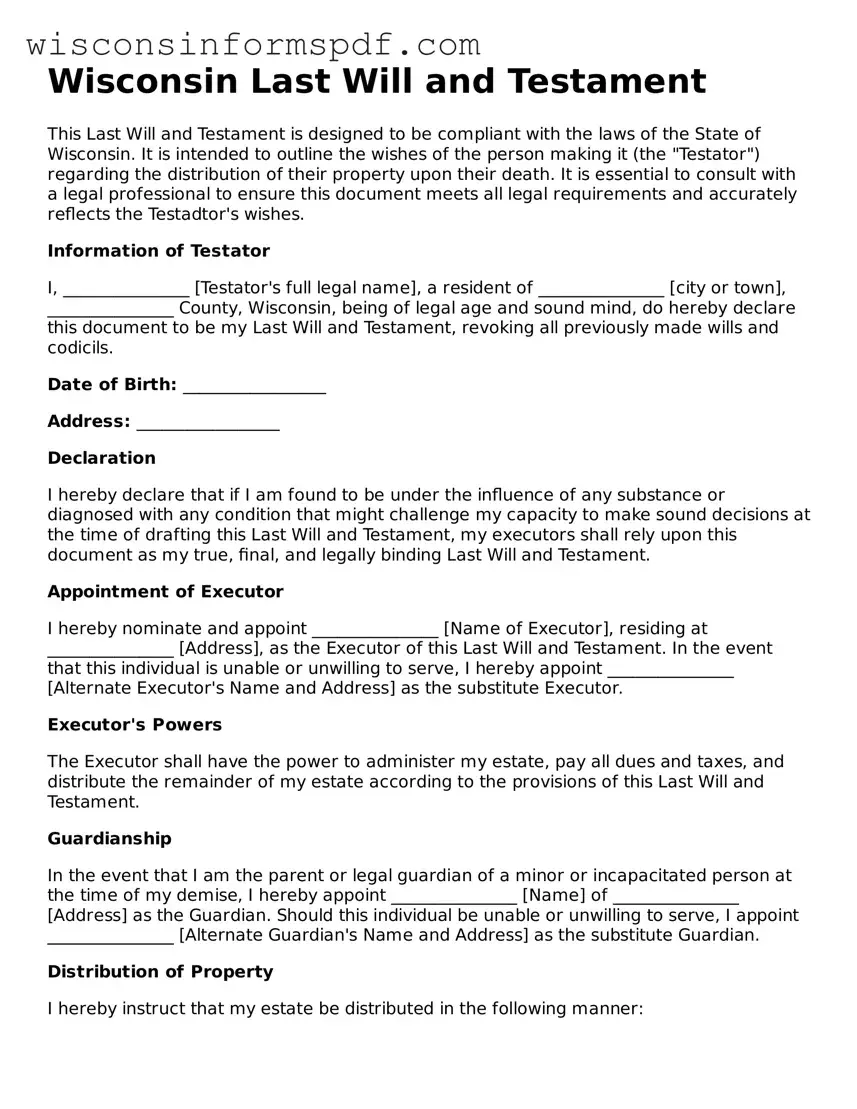Wisconsin Last Will and Testament
This Last Will and Testament is designed to be compliant with the laws of the State of Wisconsin. It is intended to outline the wishes of the person making it (the "Testator") regarding the distribution of their property upon their death. It is essential to consult with a legal professional to ensure this document meets all legal requirements and accurately reflects the Testadtor's wishes.
Information of Testator
I, _______________ [Testator's full legal name], a resident of _______________ [city or town], _______________ County, Wisconsin, being of legal age and sound mind, do hereby declare this document to be my Last Will and Testament, revoking all previously made wills and codicils.
Date of Birth: _________________
Address: _________________
Declaration
I hereby declare that if I am found to be under the influence of any substance or diagnosed with any condition that might challenge my capacity to make sound decisions at the time of drafting this Last Will and Testament, my executors shall rely upon this document as my true, final, and legally binding Last Will and Testament.
Appointment of Executor
I hereby nominate and appoint _______________ [Name of Executor], residing at _______________ [Address], as the Executor of this Last Will and Testament. In the event that this individual is unable or unwilling to serve, I hereby appoint _______________ [Alternate Executor's Name and Address] as the substitute Executor.
Executor's Powers
The Executor shall have the power to administer my estate, pay all dues and taxes, and distribute the remainder of my estate according to the provisions of this Last Will and Testament.
Guardianship
In the event that I am the parent or legal guardian of a minor or incapacitated person at the time of my demise, I hereby appoint _______________ [Name] of _______________ [Address] as the Guardian. Should this individual be unable or unwilling to serve, I appoint _______________ [Alternate Guardian's Name and Address] as the substitute Guardian.
Distribution of Property
I hereby instruct that my estate be distributed in the following manner:
- _______________ [Description of item or property] to _______________ [Name of beneficiary], of _______________ [Address].
- _______________ [Description of item or property] to _______________ [Name of beneficiary], of _______________ [Address].
- More items can be added accordingly.
Signatures
This Last Will and Testament will not be considered valid unless signed in the presence of at least two witnesses, neither of whom are beneficiaries of this will. All parties should sign and print their names below to confirm their agreement and understanding of this document's contents.
_________________ [Date]
_________________ [Testator's Signature]
_________________ [Testator's Printed Name]
Witnesses
- Witness 1 Signature: _______________
- Witness 1 Printed Name: _______________
- Witness 2 Signature: _______________
- Witness 2 Printed Name: _______________
This document was signed in the County of _______________, State of Wisconsin.

